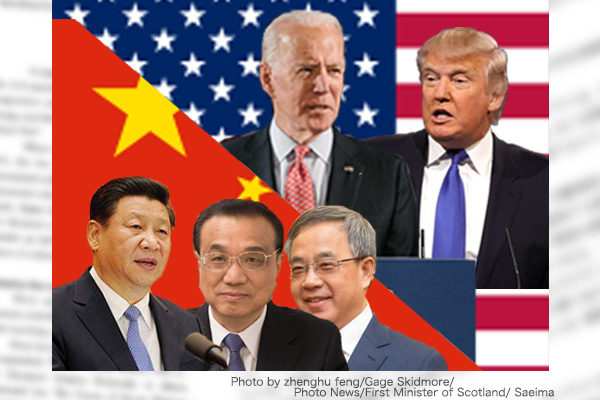On November 7, former U.S. Vice President and Democratic presidential candidate Joe Biden declared his victory in the presidential election. While the United States is likely to remain plagued with court battle with President Donald Trump who has complained about “fraudulent” vote-counting, China’s President Xi Jinping should have been relieved to hear that Biden has secured his victory in the election. This is because the Xi’s domestic and foreign policies have been greatly damaged by the confrontation with the Trump administration over the past two years, forcing Chinese diplomats to be busy with addressing the confrontation.
Biden is likely to take a more conciliatory China policy than Trump, while the Xi government is likely to make utmost efforts to mend bilateral relations. But the disappearance of Trump as a strong foreign enemy could lead power struggle within the Chinese Communist Party to intensify. “Although Xi has called for the party’s unity by emphasizing the importance of struggle with the United States, the relaxation of tensions with the U.S. could prompt cooperative internationalists within the party to rise,” said a CCP source in Beijing.
Power struggle could intensify in China
Attracting attention are moves of Premier Li Keqiang, Vice Premier Hu Chunhua, and others from the Young Communist League of China, a subsidiary organization of the CCP, who have opposed confrontation with the U.S. and kept their distance from President Xi. Particularly, Premier Li has emphasized the importance of deregulation on various occasions since last spring, implicitly criticizing Xi’s economic policies. Behind such move might have been intensifying struggle within the CCP for succession to Xi towards the planned CCP Congress in the autumn of 2022.
Xi will have to retire as CCP general secretary at the coming CCP Congress to mark the end of his second term if he follows suit of former general secretaries Jiang Zemin and Hu Jintao, but Xi is said to be trying to revise the party constitution to revive the chairmanship and appoint himself a lifetime chairman. Li and his supporters would like to have Vice Premier Hu Chunhua, known as a hopeful of the Young Communist League, become the next general secretary, according to sources.
The CCP power struggle will intensify from now. President Xi has plunged into a pinch by having a falling-out with many members of the Princelings, a group of descendants of former senior CCP officials, including Vice President Wang Qishan who supported Xi in his first term as general secretary. Xi, though having belonged to the group himself, has begun to confiscate assets of privileged Princelings group members for corruption and other charges in response to the recent economic stagnation, triggering his confrontation with the Princelings.
Japan should prepare for contingency
Xi, though being isolated within the CCP, has appointed his former aides to key media and police posts to counter opponents. In China, unlike in the U.S., power realignment takes place quietly behind the scenes. But a single misstep could trigger a chaos like the Cultural Revolution.
If the U.S. and China simultaneously plunge into political chaos, it would be a big trial for Japan. Expecting that the Japan-U.S. security arrangements would fail to work due to U.S. chaos, hard-liners in Chinese military might conduct outrageous acts such as an invasion of the Senkaku Islands. Japan should be prepared for every conceivable contingency.
Akio Yaita is Taipei Bureau Chief of the Sankei Shimbun newspaper.


